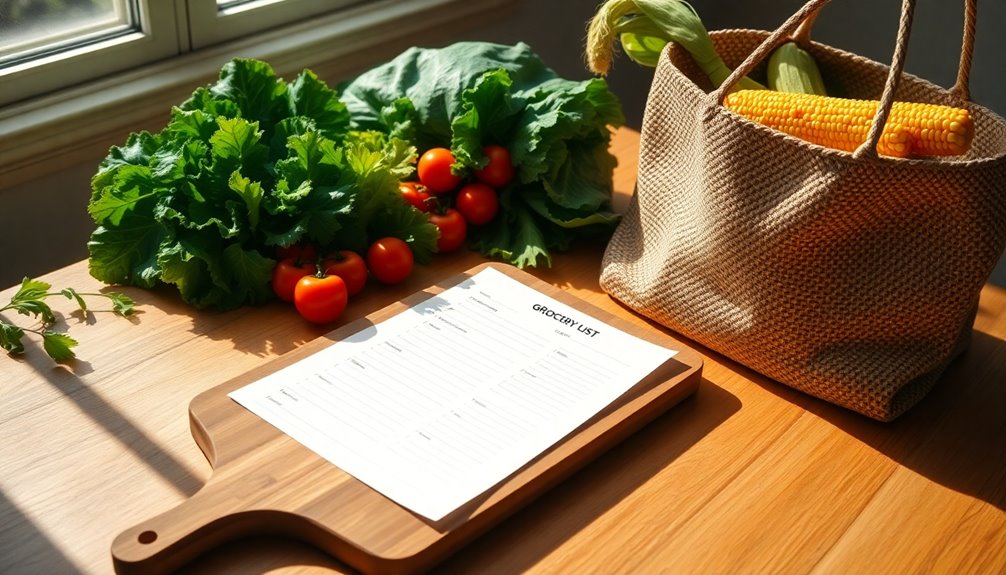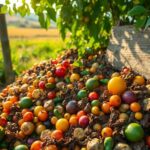To make a sustainable grocery list, start by understanding seasonal produce to support local agriculture and reduce your carbon footprint. Choose local and organic items whenever possible. Meal planning helps you avoid impulse buys and minimizes food waste, while bulk shopping can save money and lessen packaging waste. Focus on products with minimal packaging and eco-friendly options. Try to incorporate plant-based meals into your weekly plan, using leftovers creatively. By following these steps, you'll not only benefit your health but also contribute to a healthier planet. Explore further strategies to enhance your sustainable shopping habits.
Key Takeaways
- Focus on seasonal produce to support local agriculture and reduce carbon footprint.
- Choose local and organic items to prioritize sustainability and support nearby farmers.
- Plan meals ahead to minimize waste and incorporate plant-based options for healthier eating.
- Shop in bulk to save money, reduce packaging waste, and enhance convenience.
- Opt for products with minimal or recyclable packaging to lower environmental impact.
Understand Seasonal Produce
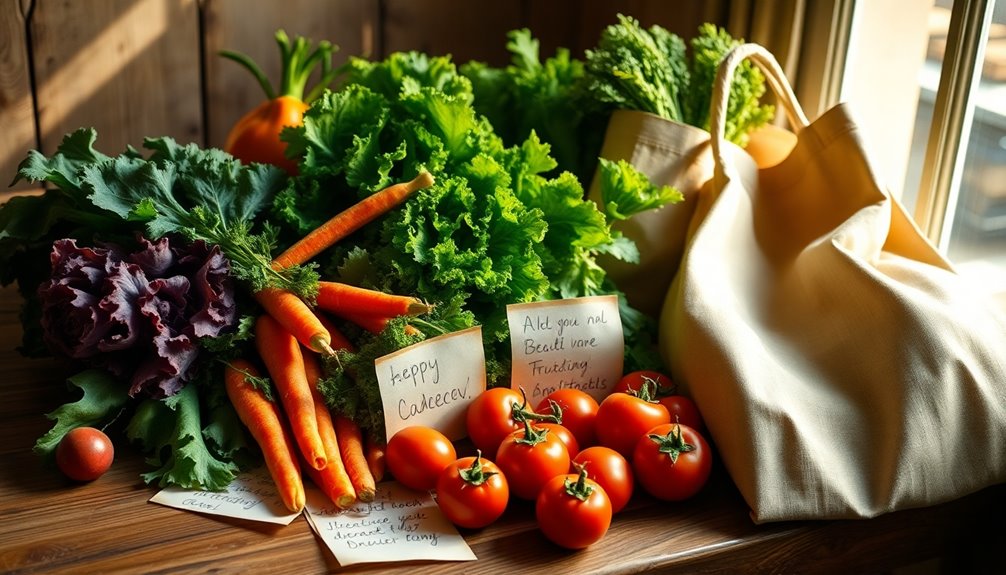
Understanding seasonal produce is crucial for creating a sustainable grocery list. When you focus on what's in season, you not only benefit from fresher options but also support local agriculture and reduce your carbon footprint. Seasonal produce is typically harvested at its peak, meaning it's tastier and packed with nutrients.
Imagine walking through a farmers market, where vibrant colors and delightful aromas surround you—this experience is a proof of the abundance of fresh options available when you align your shopping habits with nature's cycles.
By learning which fruits and vegetables are in season, you can make more informed choices. For instance, spring heralds an array of greens like asparagus and peas, while summer brings juicy tomatoes and strawberries. These fresh options not only taste better but are often more affordable, as they don't require extensive transportation or storage.
Furthermore, embracing seasonal produce can foster a sense of community. When you shop at local farmers markets, you're connecting with the people who grow your food. This relationship enriches your grocery experience and creates a supportive network that values sustainability.
Choose Local and Organic
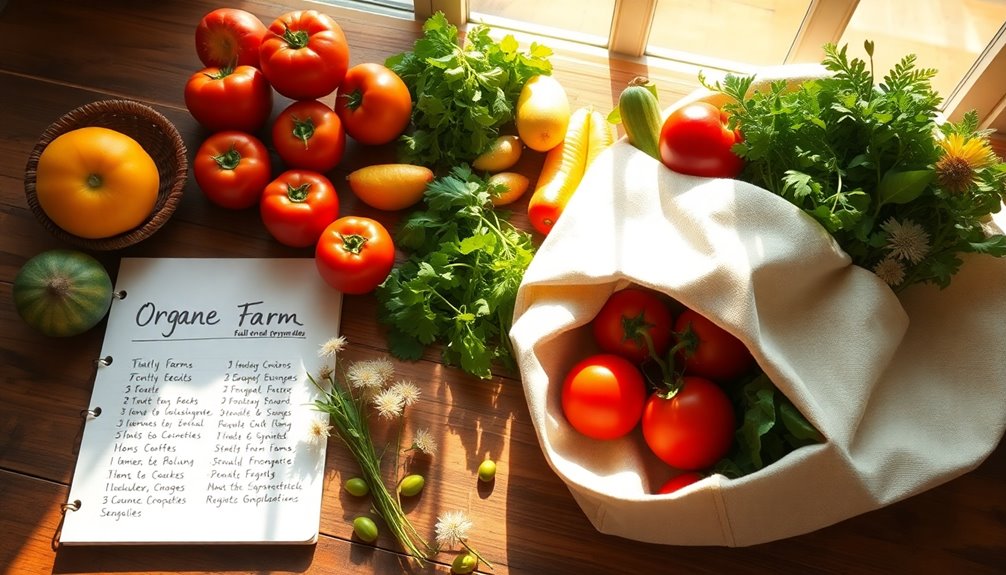
When you pick local and organic products, you're making a significant impact on both your health and the environment. By opting for these items, you're not just fueling your body with nutrient-rich foods; you're also supporting farmers in your community. Local farms often use organic practices, which means fewer chemicals and pesticides in the food you consume. This choice fosters a sense of connection to the land and the people who grow your food, creating a stronger bond within your community.
Moreover, buying local helps reduce your carbon footprint. Transportation of goods from distant regions contributes to greenhouse gas emissions. When you choose products that are grown nearby, you're minimizing the distance food travels, which ultimately lowers those harmful emissions. This practice not only benefits the environment but also secures fresher produce, as local products often go from farm to table more quickly.
You might also consider visiting farmers' markets or joining a community-supported agriculture (CSA) program to deepen your connection with local growers. These platforms allow you to engage directly with the farmers, understand their practices, and build a community around sustainable eating. Incorporating more plant-based foods into your diet can further enhance these benefits, providing you with essential nutrients while supporting local economies.
In short, selecting local and organic products is a practical way to prioritize your health while making a positive environmental impact. By supporting local farmers, you're contributing to a sustainable food system that benefits everyone in your community. So next time you're at the grocery store, remember: your choices matter.
Plan Your Meals Wisely
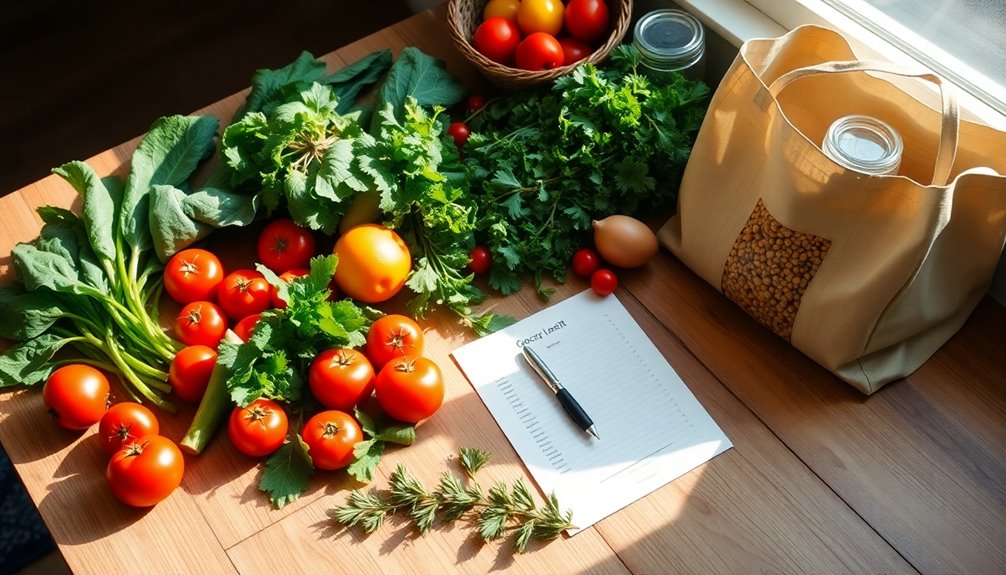
Planning your meals wisely can be a game changer for both your health and your grocery budget. You can make informed choices by taking the time to map out your meals for the week ahead. Meal prep is a powerful strategy that not only saves you time during busy weekdays but also reduces food waste. When you plan your meals, you can buy only what you need, ensuring that every ingredient serves a purpose.
Start by selecting recipes that use similar ingredients. This approach allows you to purchase in smaller quantities while maximizing your use of fresh produce. Incorporating Keto recipes into your meal planning can introduce variety and creativity, making your meals more enjoyable.
As you plan, keep portion control in mind. By determining the appropriate serving sizes for each meal, you can avoid overindulging while also minimizing leftovers that may go uneaten. This not only supports your health goals but also helps you stick to your budget.
Don't forget to include snacks and beverages in your meal plan to prevent impulsive purchases. When your grocery list reflects your planned meals, you're less likely to stray towards unhealthy options that can derail your efforts.
Lastly, consider rotating meals weekly to keep your menu fresh and exciting. When you engage in meal prep and maintain portion control, you'll cultivate a sustainable grocery routine that supports your lifestyle and fosters a sense of community by sharing meals with family and friends. Embracing this practice can lead to lasting habits that benefit both your well-being and the planet.
Embrace Bulk Shopping
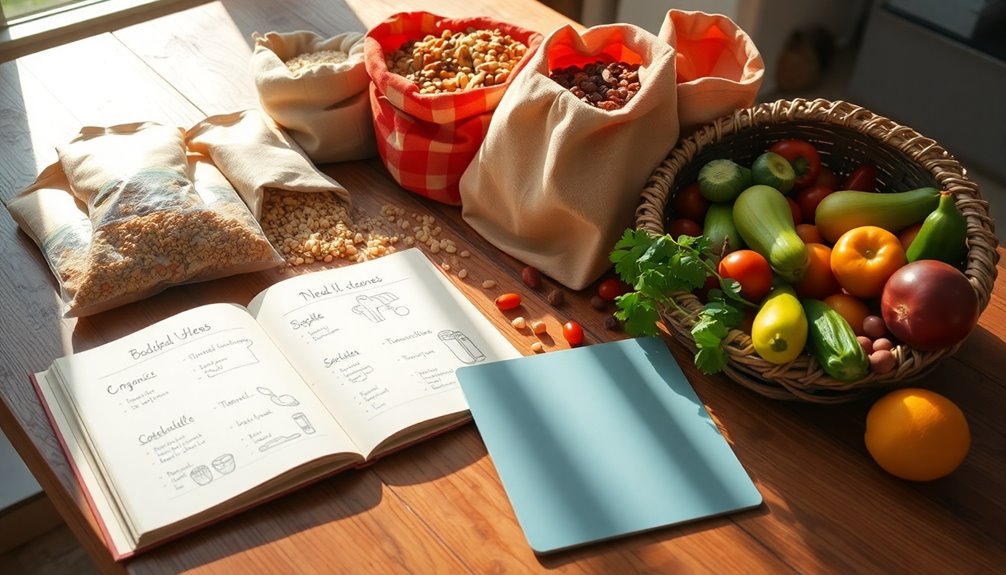
Embracing bulk shopping can greatly improve your sustainable grocery routine. By purchasing items in larger quantities, you not only save money but also contribute to a more eco-friendly lifestyle. Bulk buying reduces packaging waste, and the cost savings can be significant. Here's how you can make the most of this approach:
- Choose staple items: Focus on essentials like grains, nuts, and dried beans. These foods have a long shelf life and provide a solid foundation for your meals.
- Explore storage options: Invest in airtight containers to keep your bulk items fresh. This not only extends their lifespan but also helps you avoid waste. Plus, it makes your pantry look organized and inviting.
- Plan your purchases: Before heading to the store, make a list of what you need. This helps you avoid impulse buys and guarantees you only purchase what you'll use, maximizing your cost savings and minimizing waste.
Bulk shopping offers both convenience and sustainability. It allows you to stock up on items you regularly use, reducing the frequency of trips to the grocery store. By taking this approach, you're not just saving money; you're also becoming part of a community that values conscious consumption. Recent studies, such as those from Emory University School of Medicine, highlight the benefits of dietary management in promoting overall health.
Ultimately, embracing bulk shopping aligns your purchasing habits with your values, fostering a sense of belonging in a growing movement toward sustainable living.
Reduce Packaging Waste
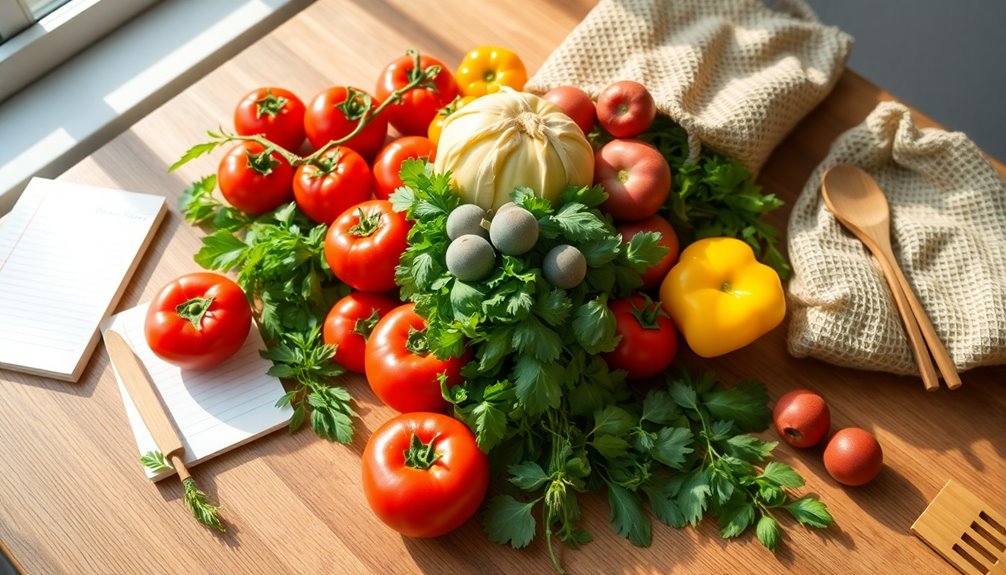
Many shoppers overlook the impact of packaging on the environment, but reducing packaging waste is an important step toward a more sustainable grocery list. When you choose products with minimal or no packaging, you contribute to less plastic in landfills and oceans, which is crucial for our planet's health. Start by bringing your reusable containers to the store. Many grocery stores now allow you to fill these containers with bulk items like grains, nuts, and spices. This not only reduces packaging but often saves you money, too.
Another effective way to minimize waste is to plan your meals wisely. By doing so, you're less likely to buy items you won't use, which can lead to excess packaging waste. If you do end up with leftovers, consider composting them. Composting is a fantastic way to reduce food waste and enrich your garden soil, fostering a sense of community and sustainability.
When shopping, keep an eye out for brands that prioritize eco-friendly packaging. Support companies that use biodegradable or recyclable materials, as your purchasing power can drive change in the market.
Lastly, remember that small changes make a big difference. Every time you opt for a product with less packaging or bring your reusable containers, you're part of a larger movement toward sustainability. Surround yourself with others who share this commitment, and you'll find a sense of belonging in your efforts to make a positive impact. Together, we can create a cleaner, healthier planet. Additionally, embracing natural calorie cycles can help promote a healthier lifestyle while reducing the environmental impact of food choices.
Frequently Asked Questions
What Are the Benefits of Sustainable Grocery Shopping for My Health?
When you embrace sustainable grocery shopping, you experience improved nutrition through fresh, organic produce packed with essential vitamins.
By choosing local and seasonal foods, you reduce toxins often found in processed options, promoting better overall health.
You'll find that connecting with local farmers and communities fosters a sense of belonging.
Making these conscious choices not only benefits your body but also contributes to a healthier environment, creating a ripple effect for everyone around you.
How Can I Involve My Family in Making Sustainable Choices?
Involving your family in making sustainable choices can turn everyday tasks into valuable family activities. Start by discussing the importance of sustainability during meals or outings, creating teaching moments that resonate with everyone.
Encourage your family to research local farms or co-ops together, making it a fun adventure. You can also assign roles during shopping trips, fostering teamwork and shared responsibility. This way, everyone actively participates, deepening their understanding and commitment to sustainable living.
Are There Apps to Help Create a Sustainable Grocery List?
Yes, there are several apps designed to enhance your sustainable living journey. These tools can guide you in eco-friendly shopping by helping you track your purchases and suggest local, sustainable products.
Apps like "Good On You" rate brands on their sustainability practices, while "Think Dirty" allows you to check product ingredients. By using these apps, you're not just shopping; you're actively participating in a community committed to a healthier planet.
What Should I Do With Leftover Food to Reduce Waste?
Imagine your kitchen as a canvas, each leftover a brushstroke waiting to create something beautiful. To reduce waste, start composting leftovers, turning scraps into nutrient-rich soil. Repurpose those bits creatively; a wilted veggie can become a hearty soup.
Embrace meal planning to prevent excess, and explore cooking creatively with what you have. Each small action connects you to a larger community, fostering belonging while nurturing the planet. Together, let's turn waste into opportunity.
How Can I Educate My Children About Sustainable Grocery Shopping?
To educate your children about sustainable grocery shopping, incorporate interactive games that teach them about food origins and environmental impact.
You could also engage them in cooking activities, emphasizing the importance of using local, seasonal ingredients.
Discuss the benefits of reducing waste and choosing eco-friendly products.
Conclusion
By crafting a sustainable grocery list, you're not just shopping—you're waging a heroic battle against climate change! Imagine transforming your kitchen into a fortress of fresh, local produce while saving the planet one organic carrot at a time. Each mindful choice you make reduces waste and supports your community, turning you into an eco-warrior for future generations. So, gear up and conquer those aisles with purpose; your sustainable grocery list is your secret weapon for a greener tomorrow!

